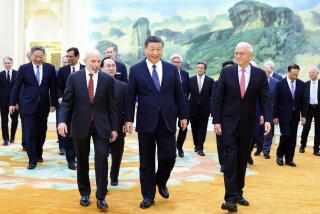Internet security a priority, Chinese president tells technology executives
SEATTLE Chinese President Xi Jinping told a group of U.S. and Chinese technology executives Wednesday that the country would give priority to a secure Internet, and defended the rights of countries to impose their own regulations on domestic Internet development.
“A secure, stable and prosperous cyberspace is of great significance” to the world, Xi said after posing for a photo with dozens of executives at the conclusion of the annual U.S.-China Internet Industry Forum held at the Microsoft campus in Redmond. The U.S. and China must work toward that goal together, he said.
Xi added that countries should formulate their domestic Internet policies “in line with their national realities.”
Xi’s remarks came after the forum, which earlier in the day brought together business and government leaders from both countries and displayed the split between U.S. and Chinese interests.
U.S. government and trade group officials emphasized, politely, their view of the necessity of a free and open Internet, and highlighted worries that new Chinese regulations will put U.S. companies operating in the country at a disadvantage.
Their Chinese peers, including the country’s chief Internet regulator, emphasized cooperation and understanding, sharing the common refrain of Chinese leaders that the country’s distinct history and level of economic development means the U.S. shouldn’t expect it to adopt the same policies toward the Web.
China has been widely criticized in the West for censorship of news, blocking of social networking sites such as Facebook, and other restrictions.
During Xi’s visit to Microsoft after the forum, Facebook Chief Executive Mark Zuckerberg appeared to speak to Xi in Mandarin just before a group photo.
Xi was greeted at Microsoft’s Redmond campus by officials including co-founder Bill Gates, Chief Executive Satya Nadella, Chairman John Thompson and President Brad Smith.
Xi and Chinese Internet czar Lu Wei posed for a photo with about 30 U.S. and Chinese technology executives, including Apple CEO Tim Cook and Amazon.com’s Jeff Bezos. Other executives represented IBM, Cisco, Intel, Lenovo, LinkedIn and Qualcomm.
After his remarks, Xi left for a tour of Microsoft’s executive briefing center, including a demonstration of Microsoft’s in-development HoloLens holographic headset.
Xi called Microsoft “the pace setter” for the global technology sector, highlighting the company’s 40-year life and the Windows operating system, which he said has “shaped man’s cognition of computer technologies.”
Xi said he was impressed by the company’s tree-lined campus and its blending “of man and nature.”
In the session at the beginning of the forum, Lu, who is the chief of China’s Internet policy, echoed the comments Xi made in a speech Tuesday night, pledging China’s cooperation on cybersecurity and emphasizing the necessity of cooperation between the two countries.
“We have to trust each other,” Lu said. “We have to solve our problems through development. We have to dissolve our differences through cooperation.”
Despite the occasionally upbeat commentary aired Wednesday, there’s significant tension between U.S. and Chinese business and government interests.
U.S. technology companies are eager to tap the potentially lucrative consumer market of the world’s most populous country, but are wary of industrial espionage and government restrictions on their ability to operate in the country. The Chinese, meanwhile, raise concerns about U.S. government surveillance and national security concerns that tend to crop up when Chinese companies make deals with U.S. competitors.
Dean Garfield, the president of the Washington, D.C.-based Information Technology Industry Council trade group, said collaboration between the U.S. and China is, “let’s say, suboptimal.” New and pending Chinese national security laws, Garfield said, “suggest that the goal is more than simply national security and may tip the scales in favor of domestic players in a way that is unfair.”
That hits home for Microsoft, which has seen its sales in China hampered by widespread software piracy. Meanwhile, Chinese regulators last year were said to open an antitrust investigation of the company, and some Chinese government agencies were said to discourage use of products made by Microsoft and other U.S. technology companies.
Garfield acknowledged that there was more work U.S. government and companies could do, too. The hope, Garfield said, is “that we’ll move beyond speaking in code, and talk to each other directly.”
Reporters were invited to about an hour of speeches that kicked off the forum, after which the proceedings went behind closed doors.
Lu bracketed his comments with a lengthy ancient Chinese parable about two people on a boat in stormy weather who must work together to take in sail and reach the shore.
“We are on the same boat,” he said. “And nobody should even think about pushing one of us off,” he added, to laughter.
(c)2015 The Seattle Times
Visit The Seattle Times at www.seattletimes.com
Distributed by Tribune Content Agency, LLC.
More to Read
Start your day right
Sign up for Essential California for news, features and recommendations from the L.A. Times and beyond in your inbox six days a week.
You may occasionally receive promotional content from the Los Angeles Times.






